Effectiveness and Tolerability of Tomoxetine in Adults With Attention Deficit Hyperactivity Disorder
Abstract
OBJECTIVE: The authors assessed the experimental noradrenergic compound tomoxetine as an alternative treatment for adult attention deficit hyperactivity disorder (ADHD). METHOD: They conducted a double-blind, placebo-controlled, crossover study of tomoxetine in 22 adults with well-characterized ADHD. RESULTS: Treatment with tomoxetine at an average oral dose of 76 mg/day was well tolerated. Drug-specific improvement in ADHD symptoms was highly significant overall and sufficiently robust to be detectable in a parallel-groups comparison restricted to the first 3 weeks of the protocol. Eleven of 21 patients showed improvement after receiving tomoxetine, compared with only two of 21 patients who improved after receiving placebo. Significant tomoxetine-associated improvement was noted on neuropsychological measures of inhibitory capacity from Stroop tests. CONCLUSIONS: This preliminary study showed that tomoxetine was effective in treating adult ADHD and was well tolerated. These promising results provide support for further studies of tomoxetine over an extended period of treatment.



